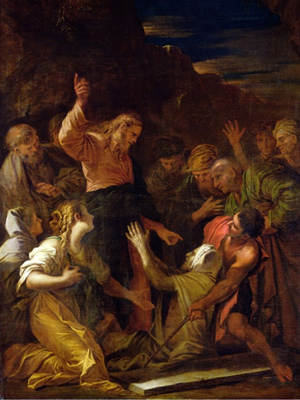
Scripture:
Reflection:
In today’s Gospel of Mark, Jesus dramatically begins his public ministry in Capernaum where he has established his residence. It is there on the Sabbath in the synagogue that Jesus astonishes all those assembled by the unique authority of his teaching. His authority comes out of his “exousia,” a Greek word that means out of his own essence, his own being. In other words, Jesus taught with a powerful divine, God-driven authority, and not like the scribes. They gained their authority of previous, respected scholars and teachers in their interpretation of the Torah. Jesus further demonstrated his authority by healing a man in the synagogue who was possessed by an impure spirit.
Soon after, Jesus comes across a leper who begs to be healed. This healing will provide additional evidence of who Jesus is and the greatness of his authority over temporal powers, the scribes, and malevolent spiritual powers, the impure spirit. In the process of healing the leper, however, Jesus also will reveal a glimpse of what kind of Messiah he would be. Not the kind of heroic, triumphant warrior king Messiah who would free Israel from the hated Romans who occupied their land. Jesus would reveal himself to be a suffering Messiah.
The leper begs Jesus, “If you want to, you can make me clean.” Jesus responds, “I do will it. Be made clean.” Jesus further instructed the leper to show himself to the priest, who would officially verify that the man is clean and may now rejoin his family and community. In addition, Jesus strictly warned the man not to tell anyone about who healed him.
In his absolute joy, however, the man healed of leprosy disregarded Jesus’ directive and proclaimed to all who would listen that it was Jesus who healed him. The irony is that it was a disobedient man who was among the first to preach the good news about Jesus. Consequently, Jesus is hampered rather than enabled to continue his ministry.
A further irony is that the leper who was once forced to live on the margins of the community is restored to community life. Jesus, who had moved freely among the villages, was now forced to live as an outcast on the outskirts of the village. These two men, in effect, traded places. Jesus finds himself suffering a leper’s isolation.
Within such irony, Mark wants his community – and us – to look closely because therein lies the Good News. Just as the healed leper traded places with Jesus, so too has Jesus traded places with us. On the outskirts of Jerusalem, Jesus would suffer on the cross in order to heal us of our “leprous” sins and restore us to eternal life in God.
Deacon Manuel Valencia is on the staff at Mater Dolorosa Passionist Retreat Center, Sierra Madre, California.
